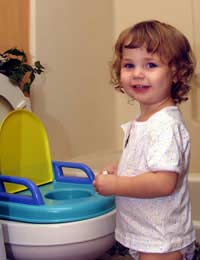Getting Your Child Ready for Pre-school

If your child is coming up to the age where they’ll be going to pre-school, then here are some ideas and tips on getting them ready for the pre-school experience.
Children attend various different forms of pre-school when they’re aged between three and five years old. Pre-school learning and education environments can involve nurseries, day centres, children’s centres, playgroups, reception classes at primary schools or even going to a registered childminder. With all of the options, there are practical things you can do to ensure your child is ready to be at pre-school.
Toilet Training
One of the usual requirements by all types of pre-schools, is that children should be successfully toilet trained by the time they attend pre-school, so this is one area which you may need to work on to get your child ready. All children grow and develop at different rates, so whilst some children may fly through toilet training with ease, others may take a while longer.If your child is still having toilet training problems when the time for pre-school is getting nearer, then have a chat to the teachers who’ll be running the pre-school. It may be nothing to worry about and some children take to it soon after going to pre-school, especially when they see the example set by other children.
Discipline and Behaviour
Children do need to have a degree of discipline and be able to respond well to instructions from a pre-school teacher, otherwise they may run into problems when they’re at pre-school. As a parent, you’re likely to also feel happier about your child if their behaviour is okay and they’re not regularly prone to throwing tantrums about the smallest of issues.If you are having any discipline problems, then recognising it in advance may give you time to try and rectify the problems before your child goes to pre-school.
Being Left Without Parents
Young children take time to get used to being left somewhere without their parents staying and it is an ability they get used to as time goes by. However, it does help make the situation a bit easier if they’re relatively comfortable about this in advance of going to pre-school. Although pre-school sessions will only be for a set time and not all day, as school will be, it’s still a big change for some children to be their without a parent in attendance too.Communication
As children will be at pre-school without their parents there too, they need to have a certain degree of communicative abilities, so they can communicate their needs verbally. This is especially important if they’re not feeling well or are having any problems, so they can communicate the issue to a responsible adult. But it also helps to be able to communicate well with the other children at pre-school and it can help them develop friendships.If your child has any communication issues, then it would be advisable to try and work on them before he goes off to pre-school.
Reading and Writing
Although some reading and writing will be worked on at pre-school, it certainly helps if your child has a basic understanding of reading and writing. Again, this is a skill that you can work on at home with your child and help them be prepared and ready to face life at pre-school.- Should You Move Your Child to a Different School?
- Choosing a School That Isn't Close to Home
- My Experience of a Private Secondary School: Case Study
- I Moved from State School to Private School: Case Study
- The Pros and Cons of a Private School
- Preparing Your Young Child for the Discipline of School
- Financing a Private School Education
- Is Your Child Ready for Pre-school?
- How Pre-schools Help Children Prepare for 'Real' School
- Reception Classes that Take Pre-schoolers
- Finding the Perfect Pre-school
- Choosing Education for Under 5s
- What Happens at Pre-school?
- Under 5s with Special Education Needs
- Getting Help with Pre-school Costs and Fees
- Free Early Learning for 3 and 4 Year Olds


Re: What Constitutes Bullying?
Kak esehiko sminor k112 gettherightschool.co.uk
Re: What to Include in an Appeal
Hi.We will move to Cardiff during the Summer vacation to be closer to my elderly parents ( having postponed the move twice due to…
Re: The Schools System in the UK
Very useful information. I did not know that there are so many different types of schools in England. I have known only Grammar…
Re: What to Include in an Appeal
My daughter didn t get a place at her first choice of secondaryschool.all her friends from school are going there.since she found…
Re: What to Include in an Appeal
Hello. We applied for a school place- secondary school for our son. We put 2 preferred schools, but he was offered a place in 3th…
Re: Moving from a State Primary to Private Secondary School
Heya. In order to decide meet with the school head teacher. Create a list of good options. Make…
Re: What If My Child Can't Get a Place at Any School in the Area?
Our grandson has not been given a senior school since September 2023 The appeal date…
Re: Sixth Form Applications
Hi, I have done Grade 12 from federal board Pakistan. Now I have migrated to UK. Now I am confused about the courses and admission…
Re: Get a Place at Grammar School
My sons are in year 9 and year 6 and planning to move in june to UK from Spain. In Spain they are in British school. Do they get…
Re: Applying to Private School: Special Needs Child
Hello, My son is 8 years old. He is going to praimary school in year 3. Speech therapist said, He have…